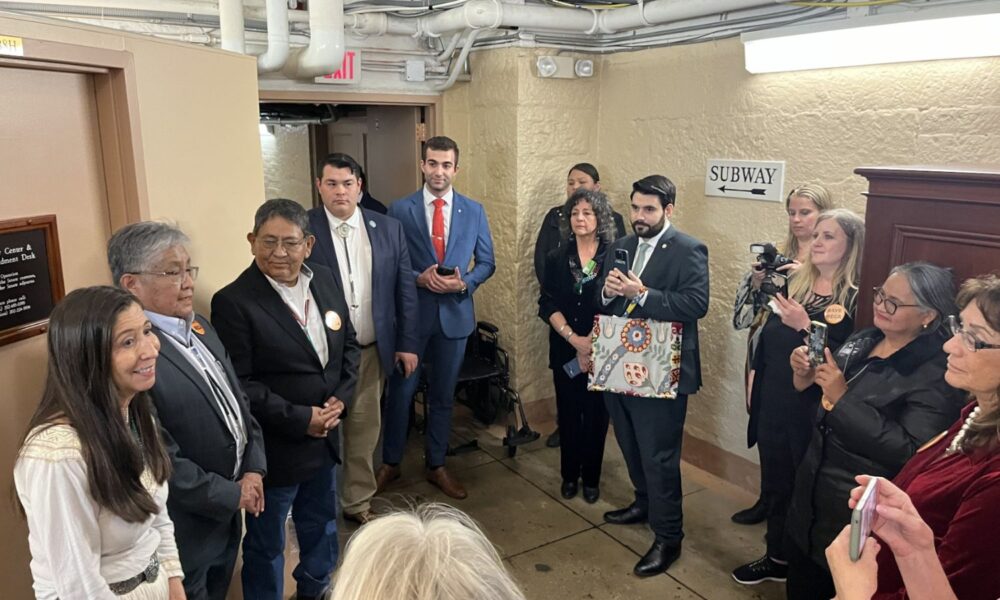The clock is ticking for the Radiation Exposure Compensation Act (RECA), which provides health screenings and compensation for people sickened by radiation from U.S. nuclear weapons production. RECA is set to expire on June 7; this would mean not only an end to life-saving health screenings and compensation, but also to the hopes of thousands of downwinders and uranium industry workers who have been unfairly excluded from the program for decades.
Last year, a wave of public attention and new findings helped propel RECA forward: “Oppenheimer” brought new attention to the Trinity Test; investigative journalism found that people in the St. Louis, Missouri, region had been exposed to dangerous Manhattan Project nuclear waste for decades; and a new Princeton study showed that fallout went further than we ever realized. Advocates seized on this opportunity and came the closest we’ve ever been to making meaningful improvements to RECA. But in December, Congress stripped an amendment to improve RECA from the National Defense Authorization Act, forcing advocates to start again.
So what has happened since December 2023?
In 2024, RECA champions in Congress reaffirmed their commitment to communities to do whatever it took to pass RECA legislation, including passing it as a stand-alone bill, or working to attach it to any piece of legislation that was moving in Congress. Here’s how that strategy has played out so far:
- February 29: Senator Josh Hawley of Missouri, sponsor of the original amendment to include RECA in the defense budget, introduces new, stand-alone legislation to reauthorize an improved RECA. This RECA reauthorization bill (S. 3853) would update downwind eligibility to include communities in Alaska, Arizona, Colorado, Idaho, Kentucky, Missouri, Montana, Nevada, Tennessee, Utah, and Guam, and finally include uranium miners who worked after 1971. This bill costs roughly $100 billion less than the RECA legislation introduced in 2023, due to reducing the amount of compensation to claimants, shortening the extension period, and removing medical benefits. While this is a painful blow to many affected communities, it is still a significant step in the right direction.
- March 7: In a major victory, the RECA reauthorization bill (S.3853), passes the Senate on a bipartisan vote of 69-30. Roughly 15 RECA advocates attend the vote in person, watching from the Senate gallery.
- March 7: Six RECA advocates representing uranium miners and downwinders join members of Congress at the State of the Union address to highlight the urgency of passing RECA improvements.
- March 11 and March 14: Representative Ann Wagner of Missouri sends bipartisan letters to House Speaker Mike Johnson urging that S.3853 be included in appropriations packages.
- March 21: While RECA amendments are not included in the final appropriations package, Speaker Mike Johnson makes a statement supporting passage of RECA reauthorization.

- April 10: Senator Hawley seeks to attach RECA legislation to child tax credit legislation.
- April 18: Representative Wagner submits a RECA amendment to the 21st Century Peace through Security Act; it is not ruled in order.
- April 18: Senator Mike Lee and Senator Mitt Romney of Utah, along with Representative Celeste Maloy of Utah, introduce a bill that would only extend RECA for two years, without provisions to improve the program and include benefits for additional impacted communities. Our RECA Working Group strongly opposes this legislation, since it would leave behind the communities, including those in northern Utah, that have been excluded for decades.

What’s next?
As of today, May 8, the House of Representatives has just 13 working days left to act on RECA. Next week, advocates from across the country will travel to Washington, D.C. to meet with members of Congress and implore Speaker Johnson to bring legislation improving and reauthorizing RECA to the floor for a vote. They will also hold a press conference and, in solidarity with an annual event in New Mexico, a prayer vigil to remember those who have already passed away while waiting for government recognition.
While U.S. nuclear tests and uranium mining were concentrated in the Southwest, RECA has helped people in all 50 states, offering life changing compensation that can be the difference between the ability to pay medical bills or not, between keeping a family in their home while a loved one is sick or not. It is a program that was created to make amends for the failure of the U.S. government to protect the public from dangerous and harmful radiation. RECA’s original boundaries and limits do not reflect the latest science on where radiation reached or the full scope of who was harmed.
Now, Congress can right this wrong by reauthorizing an improved RECA and offering a measure of justice to communities that have suffered for decades.

